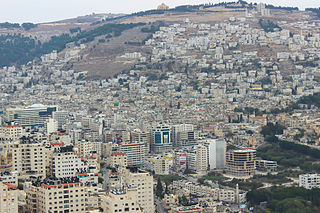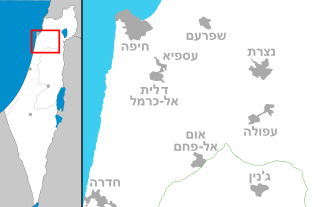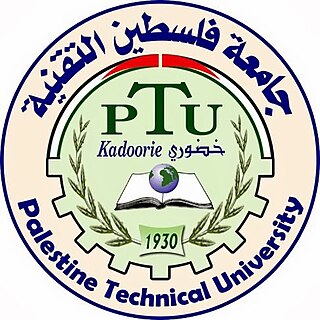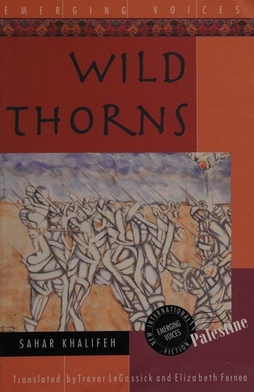
Nablus is a Palestinian city in the West Bank, located approximately 49 kilometres (30 mi) north of Jerusalem, with a population of 156,906. Located between Mount Ebal and Mount Gerizim, it is the capital of the Nablus Governorate and a commercial and cultural centre of the State of Palestine, home to An-Najah National University, one of the largest Palestinian institutions of higher learning, and the Palestine Stock Exchange. Nablus is under the administration of the Palestinian National Authority (PNA).

An-Najah National University is a Palestinian non-governmental public university governed by a board of trustees. It is located in Nablus, in the northern West Bank. The university has 22,000 students and 300 professors in 19 faculties. It is the largest university in the State of Palestine.

Ahmad Sa'adat, also known as Abu Ghassan, is a Palestinian militant and Secretary-General of the Popular Front for the Liberation of Palestine (PFLP), a Marxist–Leninist Palestinian nationalist organisation. Sa'adat graduated in 1975 from the UNRWA Teachers College, Ramallah, specializing in Mathematics. Sa'adat was elected General Secretary of the PFLP by its Central Committee in October 2001, to succeed Abu Ali Mustafa after his assassination by Israel during the Second Intifada.

The Israel Prison Service, known in Israel by its acronym Shabas or IPS in English, is the state agency responsible for overseeing prisons in Israel. It is under the jurisdiction of the Ministry of Public Security. In 2014, its workforce was 8,800.
Administrative detention is arrest and detention of individuals by the state without trial. A number of jurisdictions claim that it is done for security reasons. Many countries claim to use administrative detention as a means to combat terrorism or rebellion, to control illegal immigration, or to otherwise protect the ruling regime.
Nasser al-Din al-Shaer is the former Education Minister of the Palestinian National Authority serving as a member of Hamas. He also served as Deputy Prime Minister in the previous cabinet. After the Hamas takeover of the Gaza Strip, all Hamas ministers in the PNA government were dismissed, including al-Shaer.

Camp 1391 or Unit 1391 or Facility 1391 is an Israel Defense Forces prison camp in northern Israel for "high-risk" prisoners. It is run by Unit 504. The existence of the prison was unknown to the public before 2003, and most information about it remains classified, though Israel's supreme court ordered the release of some information about the jail.

Khalida Jarrar is a Palestinian politician. She is a member of the Popular Front for the Liberation of Palestine (PFLP) and the Palestinian Legislative Council (PLC). She was elected to the PLC in January 2006 as one of the PFLP's three deputies and has continued to serve as an elected representative ever since. She is also the Palestinian representative on the Council of Europe and is currently head of the Prisoners Committee of the PLC. She played a major role in Palestine's application to join the International Criminal Court.
The future of Palestinian prisoners detained by Israel in the context of the Israeli–Palestinian conflict is considered central to progress in the Israeli–Palestinian peace process. Cases of prison sentences include the charges of terrorism or being a member of an "illegal terrorist organization", such as Hamas or prior to the Oslo Accords the Palestine Liberation Organization, but according to some accounts also by political activism such as raising a Palestinian flag.

Palestine Technical University - Kadoorie (Formerly known as Tulkarm Community College)is an agricultural college located in Tulkarm, in the northern West Bank. The college was inaugurated in 1930 after the British Government had received a bequest from the Iraqi-born Jewish philanthropist Sir Ellis Kadoorie. The college was named in his honour and still bears his name.

Ktzi'ot Prison is an Israeli detention facility located in the Negev desert 45 miles (72 km) south-west of Beersheba. It is Israel's largest detention facility in terms of land area, encompassing 400,000 m2. It is also the largest detention camp in the world.
Libraries are provided in many prisons. Reading materials are provided in almost all federal and state correctional facilities in the United States. Libraries in federal prisons are controlled by the Federal Bureau of Prisons, U.S. Department of Justice. State prison libraries are controlled by each state's own department of corrections. Many local jails also provide library services through partnerships with local public libraries and community organizations. These resources may be limited, mostly provided through government sources.
Khader Adnan Mohammad Musa was a Palestinian activist and prisoner in Israel who died after an 87-day hunger strike in protest of his detention without trial. By the time of his death, he had been arrested 12 times by Israel. He became prominent as a figure after a 66-day hunger strike in 2011 that led to a mass hunger strike among Palestinian prisoners and his ultimate release.
Hana Shalabi is a Palestinian prisoner in Israel, held in administrative detention.
The Al-Moskobiya, Moscobiyeh, Muscovite or Moscovia Detention Centre is an Israeli detention and interrogation facility and prison more commonly known as The Russian Compound, located in West Jerusalem. The center is used to interrogate Palestinian detainees and prisoners from a variety of age groups, including children. The Palestinian NGO Addameer has alleged that harsh methods of torture are used there.

Wild Thorns is a Palestinian novel written by Sahar Khalifeh that was first published in Arabic in 1976 by Galileo Limited. Interlink International Books translated it into English in 1985. The novel portrays the lives of Palestinians under Israeli occupation in the town of Nablus in 1972 by closely following the lives of cousins who have drastically different experiences under the occupation. The Arabic title of the novel means 'prickly pears' and indicates the sweetness at the center of something that appears to be harsh and dangerous.
Israeli torture in the occupied territories refers to the use of torture and systematic degrading practices on Palestinians detained by Israeli forces in both the West Bank and Gaza Strip. The practice, routine for decades, was eventually reviewed by the Supreme Court of Israel in 1999, which found that "coercive interrogation" of Palestinians had been widespread, and deemed it unlawful, though permissible in certain cases. Torture is also practiced by the Palestinian authorities in the West Bank and the Gaza Strip.
Bushra al-Tawil or Bushra al-Taweel is a Palestinian journalist, former Palestinian prisoner and prisoners' rights activist from Ramallah who has frequently been held under administrative detention without charge by Israel. She is the spokesperson for the Aneen Al-Qaid Media Network, a local news agency specialized in covering news about the Palestinian detainees, and political prisoners.
Abd al-Sattar Tawfiq Qasim al-Khader was a Palestinian writer, thinker, political analyst, and academic. He was born in the town of Deir al-Ghusun in Tulkarm Governorate and died in Nablus. Qasim was a professor of political science and Palestinian studies at An-Najah National University in Nablus. He is known for his positions rejecting the settlement with Israel and critical of the Palestinian Self-Government Authority.

Since the outbreak of the Israel–Hamas war on October 7, 2023, Israel has carried out mass arrests and detentions of Palestinians. Thousands have been arrested in the Israeli-occupied Palestinian territories and in Israel, based on alleged militant activity, offensive social media postings, or arbitrarily.










